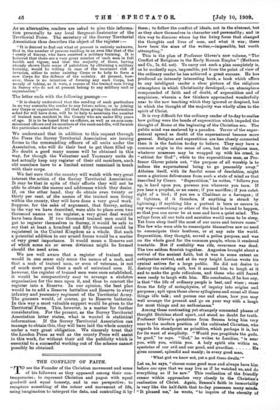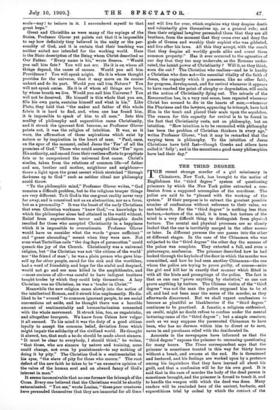• THE CONFLICT OF FAITH.
" TO see the Founder of the Christian movement and some of his followers as they appeared among their con- temporaries ; to represent Christian and pagan with equal goodwill and equal honesty, and in one perspective ; to recapture something of the colour and movement of life, using imagination to interpret the data, and controlling it by them ; to follow the conflict of ideals, not in the abstract, but as they show themselves in character and personality; and in this way to discover where lay the living force that changed the thoughts and lives of men, and what it was ; these have been the aims of the writer,—impossible, but worth attempting."
This is the plan of Professor Glover's new volume, "The Conflict of Religions in the Early Roman Empire" (Methuen and Co., 'is. 6d. net). To carry out such a plan completely is, as he modestly says, impossible, yet from the point of view of the ordinary reader he has achieved a great success. lie has produced an intensely interesting book, a book which offers to any intelligent reader a clear picture of the religious atmosphere in which Christianity developed,—an atmosphere compounded of faith and of doubt, of superstition and of scepticism, wherein a few thinkers approached wonderfully near to the new teaching which they ignored or despised, but in which the thought of the majority was wholly alien to the spirit of Christ.
It is very difficult for the ordinary reader of to-day to realise bow galling were the bonds of superstition which impeded the thought of Rome at the beginning of the Christian era. The public mind was enslaved by a paradox. Terror of the super- natural spread as doubt of the supernatural became more general. Religion and superstition are less closely connected than it is the fashion to-day to believe. They may have a common origin in the sense of awe, but the religious man, whatever nonsense may be wrapped up with his creed, is "athirst for God"; while to the superstitious man, as Pro- fessor Glover points out, "the purpose of all worship is to induce the supernatural being to go peaceably away." Atheism itself, with its fearful sense of desolation, might seem a glorious deliverance from such a state of mind as that described by Cicero. " Superstition," he writes, "follows you up, is bard upon you, pursues you wherever you turn. If you hear a prophet, or an omen; if you sacrifice ; if you catch sight of a bird ; if you see a Chaldean or a haruspex ; if it lightens, if it thunders, if anything is struck by lightning; if anything like a portent is born or occurs in any way—something or other of the kind is bound to happen, so that you can never be at ease and have a quiet mind. The refuge from all our toils and anxieties would seem to be sleep. Yet from sleep itself the most of our cares and terrors come." The few who were able to emancipate themselves saw no need to emancipate their brethren, or at any rate the world. Superstition, they thought, served a police purpose, and was on the whole good for the common people, whom it rendered tractable. But if credulity was rife, reverence was dead. The two seldom flourish together. Augustus brought about a revival of the ancient faith, but it was to some extent an antiquarian revival, and at its very height Lucian wrote his cynical satires for a large public. He did not desire to destroy the existing cult, but it amused him to laugh at it and to make the gods ridiculous, and those who still feared were ready to laugh with him. His conclusion, if he has any, is that "the life of ordinary people is best, and wiser ; cease from the folly of metaphysics, of inquiry into origins and purposes ; spit upon those clever syllogisms and count all these things idle talk ; and pursue one end alone, how you may well arrange the present and go on your way with a laugh for most things and no enthusiasms."
Among these contrasting yet strangely connected phases of thought Stoicism stood apart, and stood no doubt for truth. Professor Glover's quotations from Seneca bring him very near to the modern position of the cultivated Christian, who regards his standpoint as primitive, which perhaps it is, but for its want of simplicity. "Would you propitiate the gods, be good," he says. "God," he writes to Lucilius, "is near you, with you, within you. A holy spirit sits within us,
spectator of our evil and our good, and guardian He gives counsel, splendid and manly; in every good man,
'What god we know not, yet a god there dwells:"
Let us, be says, "choose some good man and always have him before our eyes that we may live as if he watched us, and do everything as if be saw," This realisation of the friendly censor within approaches very closely to the Christian's realisation of Christ. Again, Seneca's faith in immortality is very like the half-faith that to-day possesses many minds. "It pleased me," he wrote, "to inquire of the eternity of
souls—nay ! to believe in it. I surrendered myself to that great hope." Great and Chrisilike as were many of the sayings of the Stoics, Professor Glover yet points out that it is impossible to say how definitely they believed in the unity or the per- sonality of God, and it is certain that their teaching was neither suited nor intended for the working world. Here is the Stoic description of the Being whom Christ described as Our Father. "Every name is his," wrote Seneca. "Would you call him fate ? You will not err. He it is onwhom all things depend, the cause of causes. Would you call him Providence ? You will speak aright. He ibis whose thought provides for the universe, that it may move on its course unhurt and do its part. Would you call him Nature ? You will not speak amiss. He it is of whom all things are born, by whose breath we live. Would you call him Universe ? You will not be deceived, He himself is this whole that you see, fills his own parts, sustains himself and what is his." Like Plato', they held that "the maker and father of this whole fabric it is hard to find, and, when one has found him, it is impossible to speak of him to all men." Into this medley of philosophy and superstition came Christianity, and it struck the ignorant first because, as Professor Glover points out, it was the religion of intuition. It was; as it
were, the affirmation of those aspirations which. exist by nature or by inspiration in the heart of man. "Paul, once,
on the spur of the moment, called Jesus the 'Yes' of all the promises of God." Those who could accepted this "Yes" Upon His authority, and ceased from their restless efforts to propitiate fate or to comprehend the universal first cause. Christ's
similes, taken from the relations of common life—of father and son, brother and mother, neighbour and neighbour—
threw a light upon the great ascent which stretched "through darkness up to God" such as neither ritual nor philosophy could throw.
"To the philosophic mind," Professor Glover writes, "God remains a difficult problem, but to the religious temper things are very different. To it God is the one great reality never very far away, and is conceived not as an abstraction, nor as a force, but as a personality." It was the boast of the early Christians that even Christian workmen "knew God,"—a knowledge to which the philosopher alone had attained in the world without. Relief from superstitious terror and philosophic doubt resulted for those who accepted Christianity in a happiness which it is impossible to overestimate. Professor Glover would have us consider what the words "grace sufficient" and "grace abounding" meant when they were new. Not even what Tertullian calls "the dog days of peraecution" could quench the joy of the Church. Christianity was a universal religion, but "the Christian was not 'the citizen of the world' nor the friend of man '; he was a plain person who gave him- self up for other people, cared for the sick and the worthless, had a word of friendship and hope for the sinful and despised, would not go and see men killed in the amphitheatre, and —most curious of all—was careful to have indigent brothers taught trades by which they could help themselves. A lazy Christian was no Christian, he was a trader in Christ.'" Meanwhile the new religion came slowly into the notice of the intellectual Roman, and it struck him unpleasantly. He dis- liked to be " evened " to common ignorant people, to see social conventions set aside, and he thought there was a horrible amount of sentimentality and humanitarianism connected with the whole movement. It struck him, too, as unpatriotic, and altogether bourgeois. We know from Celsus how vulgar it all seemed. To his mind it was the duty of a good citizen loyally to accept the common belief, deviation from which might impair the solidarity of the civilised world. He thought it absurd, too, that such a to-do should be made about sinners. "It must be clear to everybody, I should think," he writes, "that those, who are sinners by nature and training, none could change, not •even by punishment—to say nothing of doing it by pity." The Christian God is a sentimentalist in his eyes, "the slave of pity for those who mourn." The root defect of the new faith he takes to be "an excessive opinion of the value of the human soul and an absurd fancy of God's interest in man."
It seems inconceivable that no one foresaw the triumph of the Cross. Every one believed that the Christians would be shortly exterminated. "You see," wrote Lucian, "these poor creatures have persuaded themselves that they are immortal for all time
and will live for ever, which explains why they despise death and voluntarily give themselves up, as a general rule ; and then their original lawgiver persuaded them that they are all brothers, from the moment that they cross over and deny the gods of Greece and worship their sophist who was gibbeted, and live after his laws. All this they accept, with the result that they despise all worldly goods alike and count them common property." Has it ever occurred to the agnostics of our day that they too may underrate, as the Romans under- rated, the latent power of Christianity ? Will it, as they think, soon die out ? The Christian who realises—and he is hardly a Christian who does aot—the essential vitality of the faith of Jesus, the capacity which it possesses, like no other faith, for progress, development, and for revival whenever it appears to have reached the point of atrophy or degradation, will smile at the notion of Christianity dying out. The miracle of the Resurrection has, in a very real sense, been repeated whenever Christ has seemed to die in the hearts of men,—whenever the Pharisees and the lawyers, appearing to triumph, have laid Him in the tomb and placed their seals upon the sepulchre. The reason for this capacity for revival is to be found in the fact that Christianity rests, not on philosophy, but on intuition. "How intuition is to be reconciled with philosophy has been the problem of Christian thinkers in every age," writes Professor Glover, "but it may be retharked that the varying term is philosophy. To the intuition of Jesus Christians have held fast—though Greeks and others have called it folly '; and in the meantime a good many philosophies have had their day."











































 Previous page
Previous page